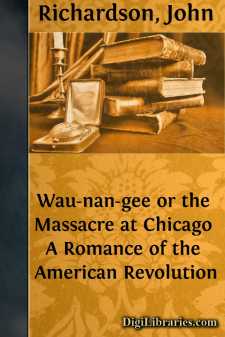Categories
- Antiques & Collectibles 13
- Architecture 36
- Art 48
- Bibles 22
- Biography & Autobiography 813
- Body, Mind & Spirit 142
- Business & Economics 28
- Children's Books 15
- Children's Fiction 12
- Computers 4
- Cooking 94
- Crafts & Hobbies 4
- Drama 346
- Education 46
- Family & Relationships 57
- Fiction 11829
- Games 19
- Gardening 17
- Health & Fitness 34
- History 1377
- House & Home 1
- Humor 147
- Juvenile Fiction 1873
- Juvenile Nonfiction 202
- Language Arts & Disciplines 88
- Law 16
- Literary Collections 686
- Literary Criticism 179
- Mathematics 13
- Medical 41
- Music 40
- Nature 179
- Non-Classifiable 1768
- Performing Arts 7
- Periodicals 1453
- Philosophy 64
- Photography 2
- Poetry 896
- Political Science 203
- Psychology 42
- Reference 154
- Religion 513
- Science 126
- Self-Help 84
- Social Science 81
- Sports & Recreation 34
- Study Aids 3
- Technology & Engineering 59
- Transportation 23
- Travel 463
- True Crime 29
Wacousta : a tale of the Pontiac conspiracy (Complete)
by: John Richardson
Categories:
Description:
Excerpt
It is well known to every man conversant with the earlier history of this country that, shortly subsequent to the cession of the Canadas to England by France, Ponteac, the great head of the Indian race of that period, had formed a federation of the various tribes, threatening extermination to the British posts established along the Western frontier. These were nine in number, and the following stratagem was resorted to by the artful chief to effect their reduction. Investing one fort with his warriors, so as to cut off all communication with the others, and to leave no hope of succor, his practice was to offer terms of surrender, which never were kept in the honorable spirit in which the far more noble and generous Tecumseh always acted with his enemies, and thus, in turn, seven of these outposts fell victims to their confidence in his truth.
Detroit and Michilimackinac, or Mackinaw as it is now called, remained, and all the ingenuity of the chieftain was directed to the possession of these strongholds. The following plan, well worthy of his invention, was at length determined upon. During a temporary truce, and while Ponteac was holding forth proposals for an ultimate and durable peace, a game of lacrosse was arranged by him to take place simultaneously on the common or clearing on which rested the forts of Michilimackinac and Detroit. The better to accomplish their object, the guns of the warriors had been cut short and given to their women, who were instructed to conceal them under their blankets, and during the game, and seemingly without design, to approach the drawbridge of the fort. This precaution taken, the players were to approach and throw over their ball, permission to regain which they presumed would not be denied. On approaching the drawbridge they were with fierce yells to make a general rush, and, securing the arms concealed by the women, to massacre the unprepared garrison.
The day was fixed; the game commenced, and was proceeded with in the manner previously arranged. The ball was dexterously hurled into the fort, and permission asked to recover it. It was granted. The drawbridge was lowered, and the Indians dashed forward for the accomplishment of their work of blood. How different the results in the two garrisons! At Detroit, Ponteac and his warriors had scarcely crossed the drawbridge when, to their astonishment and disappointment, they beheld the guns of the ramparts depressed—the artillerymen with lighted matches at their posts and covering the little garrison, composed of a few companies of the 42nd Highlanders, who were also under arms, and so distributed as to take the enemy most at an advantage. Suddenly they withdrew and without other indication of their purpose than what had been expressed in their manner, and carried off the missing ball. Their design had been discovered and made known by means of significant warnings to the Governor by an Indian woman who owed a debt of gratitude to his family, and was resolved, at all hazards, to save them.
On the same day the same artifice was resorted to at Michilimackinac, and with the most complete success. There was no guardian angel there to warn them of danger, and all fell beneath the rifle, the tomahawk, the war-club, and the knife, one or two of the traders—a Mr. Henry among the rest—alone excepted.
It was not long after this event when the head of the military authorities in the Colony, apprised of the fate of these captured posts, and made acquainted with the perilous condition of Fort Detroit, which was then reduced to the last extremity, sought an officer who would volunteer the charge of supplies from Albany to Buffalo, and thence across the lake to Detroit, which, if possible, he was to relieve. That volunteer was promptly found in my maternal grandfather, Mr. Erskine, from Strabane, in the North of Ireland, then an officer in the Commissariat Department....










